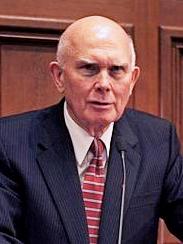
Dallin Harris Oaks is an American religious leader and former jurist and academic who since 2018 has been the first counselor in the First Presidency of the Church of Jesus Christ of Latter-day Saints. He was called as a member of the church's Quorum of the Twelve Apostles in 1984. Currently, he is the second most senior apostle by years of service and is the President of the Quorum of the Twelve Apostles.

The 1911 Revolution, also known as the Xinhai Revolution or Hsinhai Revolution, ended China's last imperial dynasty, the Qing dynasty, and led to the establishment of the Republic of China. The revolution was the culmination of a decade of agitation, revolts, and uprisings. Its success marked the collapse of the Chinese monarchy, the end of over two millennia of imperial rule in China and over 200 years of the Qing dynasty, and the beginning of China's early republican era.

Richard Bennett Hubbard Jr., occasionally referred to by the nickname Jumbo, was the 16th governor of Texas from 1876 to 1879 and United States Envoy to Japan from 1885 to 1889. He was a Confederate veteran of the American Civil War and was a member of the Democratic Party.
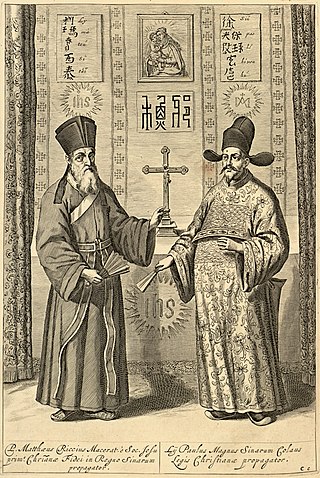
The Catholic Church first appeared in China upon the arrival of John of Montecorvino in China proper during the Yuan dynasty; he was the first Catholic missionary in the country, and would become the first bishop of Khanbaliq (1271–1368).
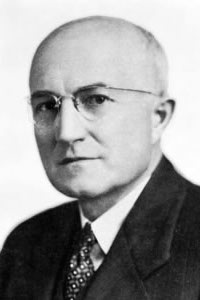
Kenneth Scott Latourette was an American Baptist minister and historian, specialized in Chinese studies, Japanese studies, and the history of Christianity. His formative experiences as a Christian missionary and educator in early 20th-century Imperial China shaped his life's work. Although he did not learn the Chinese language, he became known for his study of the history of China, the history of Japan, his magisterial scholarly surveys on world Christianity, and of American relations with East Asia.
The Society for Historians of American Foreign Relations (SHAFR) was founded in order to "promote excellence in research and teaching of American foreign relations history and to facilitate professional collaboration among scholars and students in this field around the world." It hosts an annual conference, and publishes the quarterly Diplomatic History. It also publishes a triennial newsletter, Passport. SHAFR has increasingly fostered connections with international historians and organizations.
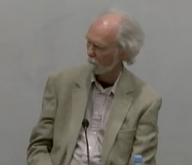
Barry Gordon Buzan, FBA, FAcSS is a British political scientist. He is an Emeritus Professor of International Relations at the London School of Economics and a honorary professor at the University of Copenhagen and Jilin University. Until 2012 he was Montague Burton Professor of International Relations at the LSE. Buzan sketched the Regional Security Complex Theory and is therefore together with Ole Wæver a central figure of the Copenhagen School.
Kenneth Guy Lieberthal is an American professor and politician known as an expert on China's elite politics, political economy, domestic and foreign policy decision making, and on the evolution of US-China relations.

Ernest Leroy Wilkinson was an American academic administrator, lawyer, and prominent figure in the Church of Jesus Christ of Latter-day Saints. He was president of Brigham Young University (BYU) from 1951 to 1971, simultaneously overseeing the entire LDS Church Educational System (CES). He is credited with the expansion of BYU. Under his presidency, the student body increased six times to over 25,000 students due to the university's physical growth and his aggressive recruiting policies; the number of colleges at the university increased from five to thirteen, and the number of faculty members increased four-fold. Wilkinson focused on recruiting more faculty and convincing current faculty to receive education outside the university. As a result, the number of teachers with doctorate degrees increased from 50 to 500. Associate and doctoral programs were created for BYU.
Robert Hugh Ferrell was an American historian. He authored more than 60 books on topics including the U.S. presidency, World War I, and U.S. foreign policy and diplomacy. One of the country's leading historians, Ferrell was widely considered the preeminent authority on the administration of Harry S. Truman, and also wrote books about half a dozen other 20th-century presidents. He was thought by many in the field to be the "dean of American diplomatic historians", a title he disavowed.

Given textual and archaeological evidence, it is thought that thousands of Europeans lived in Imperial China during the Yuan dynasty. These were people from countries traditionally belonging to the lands of Christendom during the High to Late Middle Ages who visited, traded, performed Christian missionary work, or lived in China. This occurred primarily during the second half of the 13th century and the first half of the 14th century, coinciding with the rule of the Mongol Empire, which ruled over a large part of Eurasia and connected Europe with their Chinese dominion of the Yuan dynasty. Whereas the Byzantine Empire centered in Greece and Anatolia maintained rare incidences of correspondence with the Tang, Song and Ming dynasties of China, the Holy See sent several missionaries and embassies to the early Mongol Empire as well as to Khanbaliq, the capital of the Mongol-led Yuan dynasty of China. These contacts with the West were preceded by rare interactions between the Han dynasty and Hellenistic Greeks and Romans.
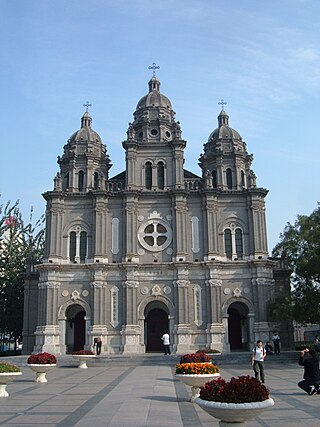
St. Joseph's Church, commonly known as Wangfujing Church (王府井天主堂) or Dongtang, is an early 20th-century Romanesque Revival church that is one of the four historic Catholic churches in the Roman Catholic Archdiocese of Beijing. It is located in the Dongcheng District of the city at 74 Wangfujing Street.

Timothy James Brook is a Canadian historian, sinologist, and writer specializing in the study of China (sinology). He holds the Republic of China Chair, Department of History, University of British Columbia.

Marilyn B. Young was a historian of American foreign relations and professor of history at New York University.

Tsai Ting Kan was a Chinese naval officer. Tsai was educated in the United States as a student on the Chinese Educational Mission and became an admiral in the Qing dynasty navy and Republican era statesman and politician.

Colin Patrick Mackerras is an Australian sinologist, Emeritus Professor at Griffith University, and specialist in Chinese culture. He has published on Chinese drama, national minorities of China, Australian-Chinese relations and images of China in the West.
Allen Suess Whiting was an American political scientist and former government official specializing in the foreign relations of China.
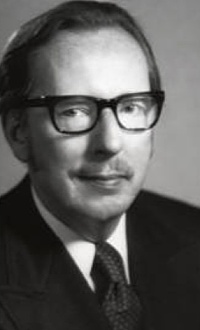
Ernest T. Campbell was an American Presbyterian clergyman, theologian, and writer. He is most remembered as senior minister of New York City's prominent Riverside Church from 1968 to 1976. A native of New York City, Campbell previously served as minister at churches in Pennsylvania and the First Presbyterian Church of Ann Arbor, Michigan. After resigning from Riverside Church, he lectured at various seminaries including his alma mater, Princeton Theological Seminary, and was Professor of Homiletics at Garrett–Evangelical Theological Seminary between 1982 and 1989.












